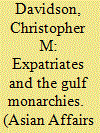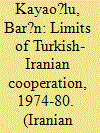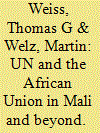|
|
|
Sort Order |
|
|
|
Items / Page
|
|
|
|
|
|
|
| Srl | Item |
| 1 |
ID:
119778


|
|
|
| 2 |
ID:
132345


|
|
|
|
|
| Publication |
2014.
|
| Summary/Abstract |
For many years huge expatriate populations have played a much documented role in the economic development of the Gulf monarchies. But a less well-told story is how expatriates have also contributed to their political stability. As non-citizens their presence in such large numbers has reinforced the elite status of most citizens in the region - an important non-pecuniary legitimacy resource for the various ruling dynasties. Moreover, the primarily employment-driven status of expatriates has meant that they have usually adopted either an apolitical or even prostatus quo stance. In some cases their perceived loyalty has led to selective naturalization or even direct co-option into security services. Disrupting this decades-old relationship, however, have been the recently changing political and economic circumstances of the Gulf monarchies. Already decisions have been made to reduce significantly expatriate populations due to accumulating pressures. Such measures are likely to threaten the historic political advantages the presence of expatriates has provided for these polities.
|
|
|
|
|
|
|
|
|
|
|
|
|
|
|
|
| 3 |
ID:
129000


|
|
|
|
|
| Publication |
2014.
|
| Summary/Abstract |
Why did Turkey and Iran fail to become close partners in the 1970s even though they had compelling reasons to do so? This article argues that mutual distrust between Turkish and Iranian leaders, domestic turmoil in the two countries, and diverging geostrategic priorities undermined Ankara and Tehran's efforts to deepen their relations. While the shah of Iran saw his country as the policeman of the Persian Gulf and the Middle East, successive governments in Turkey continued to look west for their security. As economic and political turmoil engulfed the two countries, leading to a revolution in Iran in 1979 and a coup in Turkey in 1980, Iranian and Turkish leaders could not forge a lasting partnership.
|
|
|
|
|
|
|
|
|
|
|
|
|
|
|
|
| 4 |
ID:
086792


|
|
|
| 5 |
ID:
108643


|
|
|
|
|
| Publication |
2011.
|
| Summary/Abstract |
In the last decade, the Gulf has emerged as an important focal point of Turkish foreign policy. The Arab Awakening, however, has unleashed powerful pressures for change throughout the Middle East and Gulf. The key question is what impact these pressures for change will have on Turkey's foreign policy toward the Gulf and the Middle East more broadly. Ankara's Gulf policy was predicated on the political status quo in the Gulf remaining largely intact. Can this policy still succeed? Or will it have to be redefined to deal with a new and highly dynamic strategic landscape?
|
|
|
|
|
|
|
|
|
|
|
|
|
|
|
|
| 6 |
ID:
133288


|
|
|
|
|
| Publication |
2014.
|
| Summary/Abstract |
The United Nations (UN) and the African Union (AU) have collaborated in building a viable African Peace and Security Architecture and have worked together in a number of armed conflicts over the past decade. Examples include the peace operations in Burundi and Somalia, and the hybrid peace operation in Sudan's Darfur region which is perhaps the most prominent illustration of this collaboration. Although the UN Security Council authorized the intervention in Libya, which was approved by leading regional organizations (the Arab League, the Organization of the Islamic Conference and the Gulf Cooperation Council), it was opposed initially by the AU although the three African states in the Security Council voted for it. Relations cooled as a result and have grown colder still as the UN snubbed the AU and its initial efforts to engage in post-conflict stabilization in Mali. While the AU sought to prove itself as a capable security provider and partner on the continent with its operation AFISMA, France's Opération Serval and the UN's peace operation for Mali, MINUSMA, bypassed the African Union. This article explores the underlying fault-lines between the two organizations by examining interactions between the UN and AU since the latter's launch in 2002, but focusing on the Mali case. The fault-lines emerging from the analysis are different capabilities, risk-averse vs risk-assuming approaches to casualties, diverging geopolitics and leadership rivalry.
|
|
|
|
|
|
|
|
|
|
|
|
|
|
|
|
| 7 |
ID:
131059


|
|
|
|
|
| Publication |
2014.
|
| Summary/Abstract |
Using social dominance theory and structural balance theory to analyze the political and psychological perspectives of subordinated peoples, we argue that struggles between dominant and subordinated polities are embedded in layered power structures. In such contexts, it is important to examine publics' political desires and interests in relation to their political elites' positions or choices of political tactics and allegiances. To illustrate these arguments, we used random urban samples surveyed in March 2010 to examine Lebanese and Syrian citizens' favorability toward their governments and Hezbollah (a quasi-government faction with significant relations to the governments of Iran, Syria, Lebanon, and the United States). As theorized, citizens' favorability depended on (i) how much they view their government as providing services for them, (ii) opposition to general group dominance, (iii) opposition to US oppression, and (iv) their governments' alignments vis-à-vis the US. Implications for political psychology and international relations theory are discussed.
|
|
|
|
|
|
|
|
|
|
|
|
|
|
|
|
|
|
|
|
|